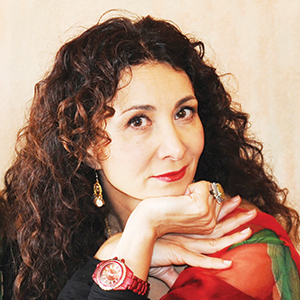Sholeh Wolpe uses poetry to unite east and west. A few years ago, the Iranian-American poet and translator came to San Jose State University and gave a talk on Attar, the legendary Sufi mystic writer from whom Rumi acquired his entire shtick.
Attar’s epic allegorical poem, The Conference of the Birds, had only been translated in a scholarly fashion, so Wolpe decided to translate a few passages into poetic English for her presentation at the Martin Luther King, Jr. Main Library. The experience moved her so much that she later wound up pursuing and getting a contract to translate the entire book, which just came out from W.W. Norton. Wolpe returned to San Jose State last week as part of her book launch enterprise. Once again, San Jose serves as the backdrop for a mystical convergence of East and West.
The Conference of the Birds is a grand allegory about the journey of the soul and the annihilation of the ego. The story recounts a perilous journey undertaken by the world’s birds, the mystics, led by another bird, the Hoopoe, who can be understood as a sage or messenger guiding the other birds toward the truth. The journey unfolds in a series of cheeky yet profound lessons, given by the Hoopoe to the birds, followed by deceptively simple parables illustrating those lessons. The parables are funny and brash on the surface, but multiple layers of meaning emerge in almost every stanza. The path articulated is an interior voyage, with the birds learning to look for the essence within, rather than be “bamboozled by externals.”
In the end, the birds realize that they are part of the Great Beloved, not separate from it. The reader need not be religious, but whatever one’s path, Attar says, if you remain still, you will dry up in your own puddle.
Regarding the translation, Wolpe realized that previous English translations were not exactly simple to follow, so she pored over different versions before using the one she felt was most accurate. She also assiduously consulted scholarly analyses, all to ensure that she was providing a simple yet poetic translation rather than a verbose work of scholarship. The intense beauty and poetic nature of Attar’s Persian is thus reimagined in contemporary English.
“The Persian language is a very flowery language,” Wolpe says. “It’s beautiful, it’s very melodic and it’s very flowery. Translating it carelessly would result in a very flowery cliched work in English. That it why it is very important for the translator to be recreating the work in a fresh language. … And that’s what I did, I used my poetic voice to make sure that the language itself is fresh.”
As a result, the book is easy to read, yet mind-blowing in its profundity. Any imaginative reader will immediately apply the parables to his or her own predicaments or even to national events. For example, the stories of the “self-satisfied bird,” driven by isolationist arrogance and devoid of wisdom, will clearly remind of egomaniacal politicians with inferiority complexes and their violent “me-first” advisers.
Another refreshing aspect of Wolpe’s translation is that all gender references are removed from the story, so we get “the Beloved” or “the Ocean” as opposed to any specific god or goddess verbiage. The Persian language does not contain “he” or “she” pronouns, but since previous translators were men, they translated everything as male or “he.” Not so with Wolpe’s translation.
Wolpe explains: “I didn’t want to turn around and make everything ‘she,’ to say, ‘Oh, I’m a female translator.’ What I did, I took it out completely. I respected the Persian language and I said, ‘Well, God, the Beloved, the Almighty, there is no gender there.’ So I just used different names for the Beloved.”
Wolpe’s pursuits don’t stop with Attar. She also recently helped translate Walt Whitman’s Song of Myself into Persian, soon to be released in Iran, now that the book finally passed the censor’s approval. In this columnist’s view, both of those geniuses—Attar and Whitman—provide insight into how we can improve the world by improving ourselves first.
“They’re both mystic poets,” Wolpe notes. “Whitman says, ‘I contain multitude.’ So you can see immediately, wow, that’s what Attar has been saying, in a different way.”




